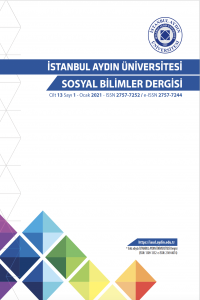A RESEARCH ON THE FACTORS AFFECTING THE PREFERENCE OF THE DEVICES AND ENVIRONMENTS IN WHICH TELEVISION DRAMAS ARE WATCHED
Media convergence, which occurs due to the development and spread of new communication technologies, enables new audience experiences. In this context, it is a current research area that the audience watches television programs from which devices and environments. From this point of view, this study aims to determine the new audience experiences by revealing the variables that affect the choice of the devices and environments in which dramas, one of the television programs types, are watched. In the study, a scale based on field research was developed, and the devices and environments in which the participants watched television dramas were tried to be determined within the scope of demographic variables. In the study applied on 18 and 55 years old, the participants were included in the research by modeling on the particular population from the sampling technique based on probability calculations. Therefore, the specific main mass of the study consists of the participants watching television dramas. The people selected according to the sample structure in question were determined as n240, and the k=03 design factor was used. As a result of the study, it was concluded that variables such as gender, age, marital status, education level, and socio-economic status affected the devices and environments in that the participants preferred to watch television dramas and showed significant differences. Concerning this, it has been seen that media convergence offers participants an alternative viewing experience in different environments.
Anahtar Kelimeler:
Television Dramas, Convergence, Demography, Audience, Variables
Keywords:
Television Dramas, Convergence, Demography, Audience, Variables,
___
- Özmen, S., Bilsel, Ö. Ç. Smartphone Use, Gender and Attachment Styles: The Fılm Of The “Cebimdeki Yabancı” (Stranger in My Pocket). Y.D. Birincioğlu, G. Parlayandemir, In Cinema and Gender, 97-110, İstanbul: Eğitim Yayınevi.
- Özmen, S., Bilsel, Ö. Ç. Smartphone Use, Gender and Attachment Styles: The Fılm Of The “Cebimdeki Yabancı” (Stranger In My Pocket). Y.D. Birincioğlu, G. Parlayandemir, In Cinema and Gender, 97-110, İstanbul: Eğitim Yayınevi.
- Rtük (2018). Television Watching Trends Research.
- Saatçioğlu, E., & İnanç, A. (2020). A Research On The Relationship Between Instagram Usage Motives, Gender And Age From The Perspective Of Uses And Gratifications Theory, Global Media Journal Tr Edition, 10(20), 131-152.
- Stanley J. B., Dennis K. D. (2009). Mass Communication Theory: Foundation, Ferment, And Future, Boston, Ma: Wadsworth Cengage Learning.
- Şimşek, A., Özmen, S. (2020). The Effects of Globalization On Turkish Dramas In Terms Of Production Practices, Intermedia International E-Journal, 7(13), 411-428.
- Walther, J.B., Carr, C.T., Choi, W.S.S., Deandrea, D.C., Kim, J., Tong, S.T., Van Der Heide, B. A. (2011). Research Agenda For Technology Convergence, Zizi Papacharissi, In A Networked Self Identity, Community And Culture On Social Network Sites, 17-39, Newyork: Routledge.
- ISSN: 2757-7252
- Yayın Aralığı: Yılda 4 Sayı
- Başlangıç: 2009
- Yayıncı: İstanbul Aydın Üniversitesi
Sayıdaki Diğer Makaleler
RADİKAL DEMOKRASİ ÜZERİNE KURAMSAL BİR İNCELEME
